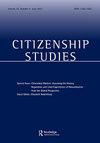看到公民身份:危机时期的单一性、多样性和复杂性
IF 1.9
3区 社会学
Q3 POLITICAL SCIENCE
引用次数: 0
摘要
摘要新冠肺炎大流行揭示了公民身份不同“面孔”同时广泛激活的现象。公民身份作为限制在制定政府对流动和公众互动的限制方面发挥了重要作用;公民身份作为社会保护是分配社会福利的基本标准。与此同时,公民身份也激发了对政府强制要求和专家意见的激进反对;公民关怀反映了在互惠和互助原则基础上形成的集体身份。这篇文章认为,在疫情期间,公民身份的不同“面孔”同时被激活,这提供了一个机会来考虑每个“面孔”的独特特征,以及它们之间的动态重叠和共同构成点。基于对复杂系统的研究,文章认为,我们如何看待公民身份会影响我们要探索的问题和分析的类型。文章以新冠肺炎大流行为背景,从复杂综合思维的角度出发,提出了看待公民身份的初步方法。文章坚持不同“面孔”的单一性和多样性,对它们的独特性以及重叠点、共同构成点和协同作用进行了初步考察。本文章由计算机程序翻译,如有差异,请以英文原文为准。
Seeing citizenship: singularity, multiplicity, complexity in times of crisis
ABSTRACT The Covid-19 pandemic brought to light the phenomenon of simultaneous and widespread activation of different ‘faces’ of citizenship. Citizenship as restriction played a major part in enacting government-imposed restrictions to mobility and public interactions; and citizenship as social protection was essential criteria for the allocation of social benefits. At the same time, citizenship also inspired radical opposition to governments’ impositions and experts’ opinion; and, citizenship as care reflected the enactment of collective identity, forged on principles of reciprocity and mutual aid. This article contends the concurrent activation of disparate ‘faces’ of citizenship during the pandemic provides an opportunity to consider both the distinctive character of each ‘face’ as well as the points of dynamic overlap and co-constitution amongst them. Building on studies of complex systems, the article argues that how we see citizenship influences the types of questions and analysis we set to explore. Using the context of the Covid-19 pandemic, the article lays out an initial approach to seeing citizenship from the vantage point of complex integrative thinking. Upholding both the singularity and multiplicity of the different ‘faces’, the article engages in preliminary examination of both their distinctiveness as well as points of overlap, co-constitution, and synergy.
求助全文
通过发布文献求助,成功后即可免费获取论文全文。
去求助
来源期刊

Citizenship Studies
POLITICAL SCIENCE-
CiteScore
3.60
自引率
11.10%
发文量
85
期刊介绍:
Citizenship Studies publishes internationally recognised scholarly work on contemporary issues in citizenship, human rights and democratic processes from an interdisciplinary perspective covering the fields of politics, sociology, history and cultural studies. It seeks to lead an international debate on the academic analysis of citizenship, and also aims to cross the division between internal and academic and external public debate. The journal focuses on debates that move beyond conventional notions of citizenship, and treats citizenship as a strategic concept that is central in the analysis of identity, participation, empowerment, human rights and the public interest.
 求助内容:
求助内容: 应助结果提醒方式:
应助结果提醒方式:


